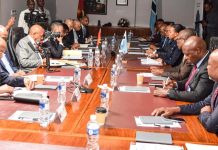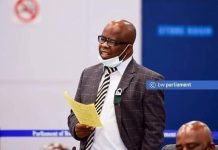Africa-Press – Botswana. The invisible threat of escalating cybercrime in the country demands increasingly and immediate robust defences from individuals, businesses and the community, cybersecurity awareness specialist, Mr David Moepeng has said.
Mr Moepeng said this at a cybercrime awareness workshop in Kanye recently. He said the primary fuel for the surge in online malice was critical lack of public knowledge and understanding.
He emphasised that cyber threats, which continued to increase required building ongoing cyber resilience to help assess, mitigate and transfer risk should an attack occur. He indicated that scammers continued to develop more sophisticated cyber threats that often challenged both the public and businesses.
The workshop aimed to equip the public with the knowledge and understanding necessary to recognise cybercrime and adopt safe online practices. Mr Moepeng indicated that cybercrime usually took place through phone calls, competitions, emails and social media posts.
He highlighted that the goal was also to sensitise the community because Batswana continued losing significant amounts of money through cybercrime, with retirees, particularly, being the targeted community.
He added that criminals targeted older adults due to factors such as accumulated savings, increased online activity as well as potentially limited technological proficiency. He also cautioned that cybercriminals had recently been targeting pensioners on their paydays and sometimes posing as traditional healers.
He further said online crimes included e-commerce fraud where non-existent goods were sold online through fake stores and delivery never took place. He said the online crimes also included investment fraud which entailed scams that promised impossibly high returns to attract victims.
For his part, Mascom Wireless fraud and forensic investigator, Mr. Geoffery Magano, stated that cybercriminals often impersonated trusted entities like banks, mobile network companies and government offices.
Mr Magano said common scams included telescam, sim-renting, sim-swap, KYC fraud as well as posing as a family member, among others. He explained that telescam was a social scheme where criminals made calls to trick and solicit confidential information from users to extort money.
He stressed that mobile network operators cannot request customer’s confidential information online. On one hand, he said sim-renting was an emerging crime where a legitimate customer bought and registered a SIM card and gave it to another user (often a scammer) to use.
“This makes scams harder to detect despite KYC efforts. SIM-renting also occurs when a lost SIM card is not de-registered or when a legitimate customer is tricked into buying a SIM card for a scammer,” he said.
He urged the public to report lost SIM cards and keep them safe.
“A customer colluding with a scammer to register a SIM is also a crime,” he said.
He further indicated that SIM-swap occurred when criminals bought a SIM card that was already in use. Again, he expressed concern that people often failed to change the default PIN of ‘quad zeros’, something he said enabled scammers to use the SIM for scamming or accessing mobile banking.
Botswana Communications and Regulatory Authority (BOCRA) analyst, Ms Keamogetse Mmokele confirmed that the Cyber Crime and Computer Incident Act enacted in 2018 was in use and should be applied in cybercrime cases.
Ms Mmokele indicated that even chiefs could apply the Act to charge offenders, particularly for actions like directing insults at people on social media through fake accounts.
BOCRA assistant compliance and monitoring officer, Mr Monkgomotsi Taolo indicated that any telecommunications equipment bought outside the country should go through BOCRA for verification to ensure that it would not cause harm to the user, such as through excessive radiation.
Mr Taolo encouraged business operators selling telecommunication equipment to have a type approval certificate and implored the public to demand to see it when buying phones.
Source: dailynews
For More News And Analysis About Botswana Follow Africa-Press






